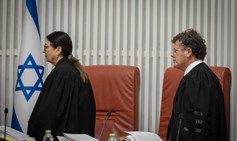

Publications Regarding Supreme Court
Articles

Should the Court Manage the Draft of the Ultra-Orthodox?
Written By: Prof. Amichai Cohen
The government’s refusal to formulate an enforcement plan for drafting ultra-Orthodox men, in defiance of a ruling by the High Court of Justice, places Israel before an unprecedented crisis. The Court faces only bad options—but it may have no choice other than to step into the shoes of the executive branch and move toward active enforcement.

The Sde Teiman Crisis and the Assault on Israel’s Rule of Law
Written By: Prof. Amichai Cohen, Prof. Yuval Shany
The court’s ruling about who can oversee an obstruction of justice investigation into military officials has broad rule-of-law implications.

What is Missing from the Court's Decision on the MAG Leak Investigation
Written By: Prof. Suzie Navot
The High Court handed down a decision allowing the Minister of Justice choose the civil servant to oversee the investigation into the Sde Teiman video leak affair in the Attorney General's stead. This sets a concerning precedent and ignores the current political reality in Israel.

A Note to Members of Knesset: Immunity Does Not Apply to Police Investigations
Written By: Prof. Suzie Navot, Dr. Moran Kandelshtein-Haina
Though Members of Knesset are granted immunity from prosecution under the law, legal precedent makes clear that this immunity does not apply to the stage of criminal investigations.

The Case for Nuance and Complexity in Israel's Polarized Politics
Written By: Prof. Benjamin Porat
Now more than ever, Israelis must be empowered to form complex, non-sloganeering positions that may not fit superficially into existing frameworks. This is the key to breaking free from the simplistic, dichotomies and gridlock in which our discourse is trapped.

Chaos in the Courtroom, Clarity on the Bench
Written By: Prof. Suzie Navot
Everything you need to know about yesterday's High Court hearing on Netanyahu's efforts to fire Shin Bet Director Ronen Bar went.

Key points to keep in mind in relation to the Supreme Court hearing on Ronen Bar's firing
Written By: Prof. Suzie Navot
IDI VP of Research Prof. Suzie Navot shares key points to keep in mind in relation to the Supreme Court hearing on Ronen Bar's firing.

Limited Protection: Israel’s High Court of Justice Rejection of Gaza Humanitarian Aid Petition
Written By: Prof. Yuval Shany, Prof. Amichai Cohen
The Israeli Supreme Court rejected the Gaza Humanitarian Aid petition submitted by a number of Israeli human rights NGOs, stating that Israel's obligations are relative in nature and that the petitioners had failed to establish that these were generally violated during the Gaza war.

Exploiting the Public's Distraction to Pursue the Judicial Overhaul
Written By: Dr. Guy Lurie
Amidst the return to fighting in Gaza, the Minister of Justice is taking advantage of the public's eye being off the ball to hastily overhaul Israel's judicial system.

Majority of Israelis Think PM Netanyahu Should Accept Responsibility for Oct 7 and Resign – Now or After the War
Written By: Prof. Tamar Hermann, Dr. Lior Yohanani, Yaron Kaplan, Inna Orly Sapozhnikova
Around half of Israelis think that it's unlikely that President Trump will turn away from Israel, if he thinks its policies are not aligned with US interests, while close to 40% think chances are fairly high or high; 73% of the total sample support continuing with the second stage of the hostage agreement and securing the release of all the hostages.

Israel’s Renewed Judicial Overhaul
Written By: Prof. Yuval Shany, Prof. Amichai Cohen
The battle over Israel’s legal system has resumed, threatening judicial independence.

The Dangerous Politicization of Judicial Appointments
Written By: Dr. Amir Fuchs
Changes in the composition of the Judicial Selection Committee threaten the independence of the judicial system. The current proposals would lead to a complete politicization of appointments to all courts and should be blocked.

Bill Proposal: Ombudsman of the Israeli Judiciary (Amendment – Appointment of the Ombudsman), 2024
Written By: Dr. Guy Lurie, Dr. Amir Fuchs
The proposed bill, which would change the selection process of the Ombudsman - responsible for investigating complaints about the conduct of judges and religious court judges - aims to intimidate judges and undermine their independence.

Justice Minister: Won't Cooperate with New Supreme Court President | Dr. Guy Lurie on Kan English Podcast
Written By: Dr. Guy Lurie
Dr. Guy Lurie, Senior Researcher at the Israel Democracy Institute, speaks to KAN reporter Naomi Segal following the election of Justice Isaac Amit to Chief Justice and the Minister of Justice's statement that he does not recognize the appointment and will not cooperate with him.

A Chief Justice Under Attack
Written By: Prof. Suzie Navot
While the selection of Justice Amit as President of the Supreme Court was done in accordance with the relevant legislation, the Justice Minister has declared the procedure "fundamentally improper and illegal." His refusal to recognize the selection creates a precedent that may lead to the deterioration of the authority of other institutions. This is what the beginning of a constitutional crisis looks like.

What is the Significance of the Justice Minister’s Declaration that he Will Not Cooperate with the President of the Supreme Court?
Written By: Dr. Guy Lurie
The lack of cooperation between the Minister of Justice and the President of the Supreme Court has numerous consequences that will, among other things, harm the services provided by the judiciary to the citizens of Israel.

A Legitimate Supreme Court President
Written By: Dr. Guy Lurie
Following Justice Isaac Amit's selection as Supreme Court President, Minister of Justice Levin immediately declared he would refrain from any collaboration between them, describing the selection process as unlawful. This announcement is both factually incorrect and a serious dereliction of his duties.

Ministers Levin and Saar's Proposed Changes to the Judicial Selection Committee
Written By: Dr. Guy Lurie
Justice Minister Yariv Levin and Foreign Minister Gideon Sa’ar presented their proposed changes to the composition of the Judicial Selection Committee (JSC) as a compromise aimed at achieving a gradual change in the judicial selection process, but many constitutional experts worry that the plan will have dire consequences resulting in the politicization of Israel’s judicial selection process.

“Democracy on the Frontlines” Conference Survey
Written By: The Israel Democracy Institute
Only a small minority of the Israeli public (8%) think that the judicial overhaul should be the government’s highest priority today; The majority of respondents (53%) support keeping the current structure of the Judicial Selection Committee. Only around a quarter (27%) suppor adding politicians to the Committee.

Does the Minister of Justice Have Immunity?
Written By: Prof. Suzie Navot, Dr. Moran Kandelshtein-Haina
In response to a petition filed against him regarding the intentional delay in appointing a president of the Supreme Court, Minister Levin claimed that it is impossible to sanction him because he enjoys “substantive immunity.” A closer examination of the law reveals that this is not the case.

“If I am not the one deciding – then we will change the rules”
Written By: Prof. Suzie Navot
In September, the Supreme Court ordered the Minister to fulfill his duty to convene the Committee because the system cannot be paralyzed. Since then, the Minister has convened the committee, but refused to appoint the Supreme Court President. Now, the Court has ordered him to do so.

New Bill Proposed Expands the Criteria for Disqualification of Electoral Lists
Written By: Dr. Amir Fuchs
A new bill proposes to amend Basic Law: The Knesset, by expanding the criteria that would disqualify candidates and lists from participating in elections based on minimal and even past expressions, interpreted as sympathy or support for armed struggle of an enemy state or terrorist organization.

The Sde Teiman HCJ Judgment: Too Little, Too Late?
Written By: Prof. Amichai Cohen, Prof. Yuval Shany
A recent judgment of the Israeli Supreme Court held that conditions in a notorious detention center must comply with Israeli law.

Constitutional Crisis – Definitions, Precedents, Implications
Written By: Dr. Amir Fuchs, Adv. Daphne Benvenisty, Dr. Nadav Dagan
Recently, Israel has faced a number of situations that could lead to a constitutional crisis. What is a constitutional crisis and why is it dangerous for the stability of democracy? IDI experts explain.

Explainer: Appointment of the President of the Supreme Court
Written By: Dr. Guy Lurie
How is the Chief Justice in Israel selected, what is the principle of seniority and how does this compare internationally? Dr. Guy Lurie explains the roles and responsibilities of the Chief Justice, an issue that is currently at the heart of a dispute between the Minister of Justice and the Courts.

Understanding the Supreme Court's Ruling: Selection of the Supreme Court President
Written By: Dr. Guy Lurie
The Israeli Supreme Court recently issued a pivotal ruling, instructing the Minister of Justice to convene the Judicial Selection Committee and select a new President of the Supreme Court. This decision come after nearly a year in which this permanent position has remained vacant.

The HCJ Strikes Back: Israel’s Supreme Court Pulls the Plug on “Judicial Reform”
Written By: Prof. Amichai Cohen, Prof. Yuval Shany
Two judgments issued by the Supreme Court in the first week of 2024 deal a decisive blow to the Netanyahu government’s efforts to radically rebalance the branches of government.

Israel needs a strong supreme court now more than ever
Written By: Dr. Guy Lurie
Justice Hayut's retirement from the presidency of the Supreme Court was well-known in advance, however, the Minister of Justice's refusal to convene the Judicial Selection Committee leaves Israel with a temporary replacement during a national emergency.

The Levin-Sa’ar Plan: Don’t Slam the Door on Someone Looking for a Way Out of Their Own Mess
Written By: Prof. Benjamin Porat
The Levin-Saar plan abandons key elements of his earlier judicial overhaul, proposing changes to judicial selection and Basic Laws. While flawed, it offers a potential starting point for bipartisan negotiations to resolve Israel’s constitutional crisis.

